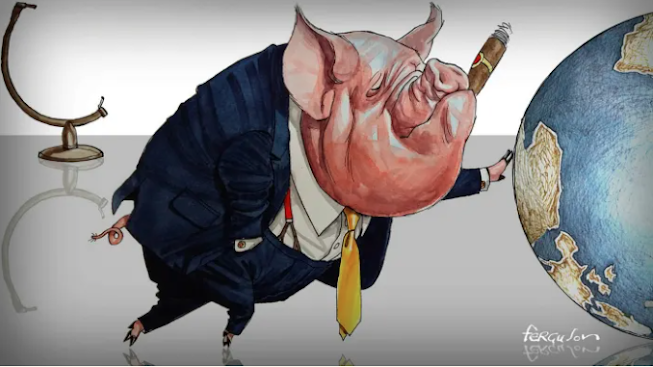Populists and kleptocrats are a perfect match
Liberal democrats in Europe and the US are not doing enough to curb money laundering
Martin Sandbu
Liberal democrats have been circling the wagons, and nowhere more so than in the EU.
The bloc sees itself as the bulwark for the rule of law, democracy and international rules against autocratic populism.
Fighting for the rule of law and liberal values is a noble cause. But it comes with a risk of inadvertently ennobling its opponents. Liberalism’s defenders often treat illiberal leaders as formidable champions of a rival ideological outlook when their motives are often much grubbier.
Consider Stephen Bannon’s recent troubles. US President Donald Trump’s first svengali was the author of the inauguration speech promising to stop “American carnage”, and a self-appointed deconstructor of the administrative state. Mr Bannon was once treated with the awe befitting a populist Faust single-handedly making battle with the Enlightenment.
But last month he was hauled off a luxury yacht and charged with defrauding a fundraising campaign. And not just any campaign: the money Mr Bannon allegedly diverted was supposed to fund Mr Trump’s Mexican border wall.
Mr Bannon has pleaded not guilty. But autocracy and kleptocracy — the capture of political power for the purposes of theft and embezzlement — often go together. They advance by similar methods: secrecy through misinformation and confusion, dismantled accountability, manipulated lawmaking and governing, and capture of law enforcement.
It is a mistake to treat the two as separate dangers, let alone one as less harmful than the other. Autocracy is often merely the means; kleptocracy is the ultimate end.
In Russia, Ukraine and several post-Soviet central Asian countries, oligarchic networks have privatised the state for their own benefit. In the US, there is a long list of former Trump associates who have been charged with crimes linked to people mostly from those very same countries.
In my mind, this leaves little doubt about the kleptocratic impulse behind Mr Trump’s attacks on independent institutions.
In Europe too, the kleptocratic alarm bells should be ringing. The use of public funds for private benefit is rife across the region. Lucrative state contracts are handed out to leaders’ personal associates from Hungary to the UK. Journalists Daphne Caruana-Galizia and Jan Kuciak were allegedly murdered for their efforts to expose self-dealing by Maltese and Slovak politicians.
Then there is the opposite problem: the use of dirty money to manipulate democratic politics. The UK parliament has highlighted how Russian oligarchs buy influence across the British establishment. Russian money has similarly come to the rescue of France’s far-right and allegedly Italy’s League.
Newly leaked disclosures of banks’ suspicious activity reports to US regulators have reinforced concerns that European banks have not done enough to prevent the laundering of the spoils of kleptocracy elsewhere; also, that Europe’s democratic leaders have not done enough to stop it.
Potential complicity with money laundering is not limited to a few countries. While money centres such as London and Cyprus have been accused of housing laundromats, banks hailing from Germany and Denmark have been accused of using them extensively. That is bad enough.
But political fecklessness causes the worst damage. Failure to crack down not only condones wrongdoing but also signals politically that this is no great priority. That invites kleptocrats elsewhere to avail themselves of Europe’s financial system for their own benefit.
If Europe unhesitatingly takes their money, no actual or would-be dictators will be impressed by political statements of condemnation. And if it easy to launder money into Europe, it can also be used to corrupt leaders there.
In short, Europe’s liberals can only hope to keep autocracy at bay if they are committed to fighting kleptocracy at home and abroad.
This requires political will. The US crackdown on dirty money leaves much to be desired, but it is well ahead of Europe. In general we learn of European banks’ most egregious wrongdoing from US authorities. More investigative resources, tougher criminal punishment and a greater determination to crack down are needed.
The EU also needs to give more power to pan-national regulators. In the single market, the weakest national regulator can undermine the efforts of others. That was true when it came to making banks safe before the 2008 financial crisis; it is equally true when it comes to making them honest.
The EU must condition access to its banks with collaboration on its anti-money laundering efforts. London also leaves the single market on January 1. But as part of any Brexit deal, the EU should not be shy about demanding that the UK clean up the City’s act on tax evaders and money launderers.
More generally, the EU should guard access to euro-denominated finance as jealously as the US does with the dollar.
Finally, it is time to do away with bank account secrecy, not just formally but effectively: all EU money must be traceable to natural persons, with uniform legal identifiers to make this logistically straightforward.
Commission president Ursula von der Leyen said last week that “European values are not for sale”. Time, then, to stop selling them out.

0 comments:
Publicar un comentario